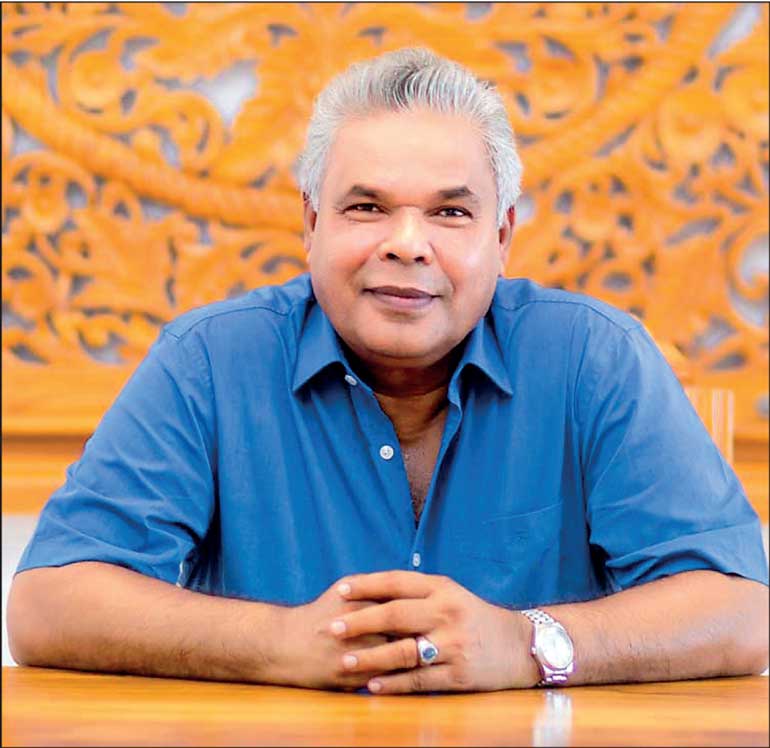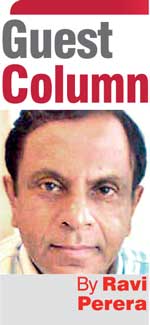Thursday Feb 12, 2026
Thursday Feb 12, 2026
Friday, 23 February 2024 00:05 - - {{hitsCtrl.values.hits}}

By chasing away Dudley Sirisena in that manner, the students violated a basic tenet of higher learning
“Everything is abnormal in our society; that is how these things happen, and, when they do, nobody knows how to act – not only in the most difficult situations, but even in the simplest”
– Fyodor Dostoevsky
“Happy families are all alike, every unhappy family is unhappy in its own way” – Anna Karenina-Leo Tolstoy
Sirisena should have been heard by the students. From every dialog there is something to be learnt. When a person talks about his career, he is invariably the hero of the story, his success is presented in heroic terms. It is for the listener to give an intelligent ear. Openness to the ‘other’ is fundamental to the intellectual process
 Going by the various posts, it is obvious that there is a certain fascination with Dudley Sirisena on the part of the social media; more than most other businessmen or politically connected persons. Possibly, the perception that he is a decisive ‘player’ in the rice market, the staple food of the country, gives rise to the public’s curiosity. Perhaps, it is the Western suit he prefers at formal occasions like weddings, unlike his more famous brother who remains in the traditional dress, is what evokes interest.
Going by the various posts, it is obvious that there is a certain fascination with Dudley Sirisena on the part of the social media; more than most other businessmen or politically connected persons. Possibly, the perception that he is a decisive ‘player’ in the rice market, the staple food of the country, gives rise to the public’s curiosity. Perhaps, it is the Western suit he prefers at formal occasions like weddings, unlike his more famous brother who remains in the traditional dress, is what evokes interest.
Even the name titillates, names such as ‘Dudley’, ‘Percy’, ‘Mervyn’ and ‘Reggie’; very English names on very un-English personalities, a particularly common practice among an older generation of Sri Lankans. The resulting sense of unreality, the mismatch, is explained away by reference to the more than a century occupation of the island by the British. An explanation which does not extend to all colonial stories; it is difficult to conceive of the Indian independence movement under the leadership of a ‘Don Stephen’ Gandhi or a ‘Solomon West Ridgeway’ Nehru.
Dudley Sirisena is from a high achieving family, his brother Maithripala Sirisena was elected President in 2015, voted in on a platform of ‘Good Governance’, an ingredient which he claimed was sorely lacking in the then reigning Mahinda Rajapaksa government of which he was a minister almost to the last day. How often we are provided with such political idylls! Like the nebulous ‘Dharmista’ (righteous) of half a century ago, ‘Good Governance’ also proved to be still-born!
Hardly had the Sirisena government commenced when it was hit by a deeply wounding scandal at the Central Bank. Their newly appointed Governor had a son-in-law who was a primary dealer in government bonds. Within a few weeks there were allegations of favouritism and interference at the bank in favour of the young man. Every Government magnifies the significance of its appointees to high posts, a hype contradicted by the sum results of the 70 years since independence; most appointees have been bad, the rest even worse! It seems failed cultures see things in a manner peculiar to themselves, a view which is then elevated to an article of faith by the prevailing social narration of that culture; ‘he is like an encyclopaedia’, ‘he is a product of Oxford’, ‘he has held an important post overseas where white people reported to him (Sunak clones!)’, ‘his English is so good even Englishmen are impressed!’; utter nonsense of a nonsensical society, a failed society on nearly every score.
With the Central Bank scandal impacting the very basis of the mandate, the 2015 Government soon became a farce, the coup de grace coming in the form of the Easter bombings of 2019. The diminishing of Maithripala Sirisena was rapid; a befuddled man on a large stage, confronting complexities never considered in his philosophy. At the Presidential elections held in November of that year Gotabaya Rajapaksa the opposition candidate triumphed with a large majority of votes. The continuation of the tragicomedy under this Rajapaksa is yet another episode of the saga.
Is hard work the critical factor in business success in our country?
If Maithripala Sirisena owes his ascend to the presidency of a country to the broad political methods and structures that came with the European occupation, Dudley Sirisena ought to be doubly grateful to that interlude, the relentless march of capitalism opens newer and greater opportunities evermore for those with the necessary wherewithal.
In a recent interview Dudley Sirisena expands on the sacrifices and the hard work that brought him financial success. We have no doubts about his assertion, success in any field demands unusual effort. Nevertheless, is hard work the critical factor in business success in our country? To elevate his particular story of labour, is to deny the daily labours of manual workers, office workers, professionals, varied categories of artists who also work hard, but are barely keeping their heads above water.
The world is not a fair place, certain economic activities; business, investments, speculation, wheeler-dealing and even professions can bring in disproportionately large rewards relative to a regular 8-5 job. Business activity, by its very nature carries risks, not every businessman is a success. However, in developed societies while there are the mega rich, the rest of the society also enjoy high living standards. In contrast, in countries like Sri Lanka, while a handful indulge in an excessive lifestyle, most can hardly afford three meals for the family on their subsistence level salary. It seems, the value they add to a product or a service, is in the main expropriated by the owners of capital.
Politics in Sri Lanka is a patronage business. Our public sector dances to the tune emanating from the intertwining of a corrupt political culture and sleazy business methods. Furthermore, that most essential element for business success, bank credit, is also a matter of who you know or how much political clout you carry (examine the top defaulters of any of our banks, the names tell a tale). Many a member of parliament has become prosperous entrepreneurs after being elected as legislators. The reverse is also happening; having acquired money in what is a very dubious business world, businessmen offer themselves as the solution to the country’s political problems.
To observe this unholy relationship between business and politics, you have to only attend one of their family weddings or funerals; the gross bonhomie on festive occasions, the oleaginous speeches at funerals; how they break bread on joyous occasions, how they mourn the passing of their kind!
Dudley Sirisena accounts his financial success to hard work and sagacious entrepreneurship.
A few days ago, Dudley Sirisena was invited to a Colombo university to give a talk, presumably on business. When he arrived, a large body of students got on the road obstructing his vehicle, protesting his arrival. They did not wish him inside the university, leave alone listen to him. The rough and ready businessman had no choice, he had to turn back.
Visionaries, inventors and motivators
In other countries it is very common for institutions of higher learning to have captains of industries talking to the students. They not only widen the horizons of the students but also give them larger ambitions. Some of such invited speakers may be controversial, but, by and large, they are visionaries, inventors and motivators whose entrepreneurial activities have made the lives of millions across the world better.
A student’s world need not be limited to making a living out of a State owned enterprise or a life as a stoic government servant dictating policy to a hapless public.
Because of advancements in the computer industry we can now communicate with any person on earth in a matter of seconds. Governments today cannot impose censorships or restrict information. Social media has made it difficult to hide misuses, including human rights abuses. In our own lifetime, the sheer number of improvements seen even on a basic car, from signal lights to protective airbags, have made motoring more pleasurable and a lot safer. More and better innovations are improving the quality of everything humans use, from medicine to sporting equipment, from food packaging to home-deliveries, entrepreneurs are driving the transformation at a pace unbelievable a few years ago. Whether you like it or not, tomorrow happens.
Needless to stress, our entrepreneurs are not of global calibre, content with replicating models and methods that have been in existence, in some cases, more than a hundred years now. Almost one hundred percent of the ideas and of course the equipment they use are imported. We have neither the capital nor the capabilities to make them here. Even when we attempt, it is like making a wheel, which can be obtained somewhere else easily. However, in this small economy some have accumulated a certain amount of wealth, enabling them to live a First World life in a Third World country. Perhaps they inherited some money, or, more likely, had an instinctive grasp of the native realities; who to befriend, whose palm to grease.
Yet, Sirisena should have been heard by the students. From every dialog there is something to be learnt. When a person talks about his career, he is invariably the hero of the story, his success is presented in heroic terms. It is for the listener to give an intelligent ear. Openness to the ‘other’ is fundamental to the intellectual process.
By chasing away Dudley Sirisena in that manner, the students violated a basic tenet of higher learning. The truth emerges only when opinion is allowed free expression. Another’s opinion does no harm to the listener, unless he allows it to. Institutions of higher learning ought to be sacred places, where thoughts flow freely, a million flowers bloom. Today in nearly every seat of responsibility in this country, from the President to the Peon, we have products of our education system. The same goes for the so called private sector. When considered against comparable Asian countries like Malaysia or South Korea, our failures become apparent. Not only do we lag far behind, we lurch from crisis to crisis.
Although financially Dudley Sirisena is at another level, his compatibility, both socially and culturally, with the students protesting his arrival at the university is undeniable. The vast majority of them are of rural background, and, perhaps resentful of social realities they perceive in a larger world. Although Dudley Sirisena had broken out of his condition, he was perhaps conceived as a mirror reflection of themselves, only older.
They obviously did not like what they saw.
: .